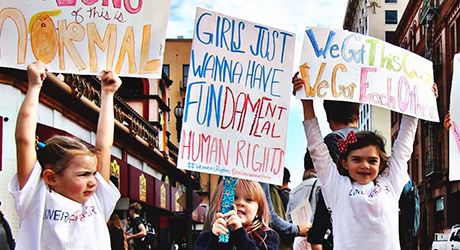CEDAW in your daily life
What is the Convention on the Elimination of All Forms of Discrimination against Women (CEDAW)?
Adopted by the United Nations in 1979, CEDAW is the most important human rights treaty for women.
 The Convention currently has 189 states parties. Thus, the vast majority of the member states of the UN (193) have voluntarily agreed to respect, protect, promote and fulfil the human rights of women under all circumstances.
The Convention currently has 189 states parties. Thus, the vast majority of the member states of the UN (193) have voluntarily agreed to respect, protect, promote and fulfil the human rights of women under all circumstances.
Why is CEDAW important?
CEDAW, also known as the treaty for the rights of women, is a tool that helps women around the world to bring about change in their daily life. In countries that have ratified the treaty, CEDAW has proved invaluable in opposing the effects of discrimination, which include violence, poverty, and lack of legal protections, along with the denial of inheritance, property rights, and access to credit.
The treaty has contributed the development of:
- citizenship rights in Botswana and Japan;
- inheritance rights in Tanzania;
- property rights and political participation in Costa Rica.
CEDAW has also fostered adoption of:
- a law on gender equality in Mongolia;
- a law in Rwanda prohibiting sex-based discrimination in access to land;
- domestic violence laws in Turkey, Nepal, South Africa, and the Republic of Korea;
- legislation criminalizing all forms of violence against women in Burkina Faso and femicide in Panama;
- a national inquiry into missing and murdered indigenous women in Canada;
- anti-trafficking laws in Ukraine and Moldova.
In addition, in response to CEDAW’s concluding observations, China took measures to curb cases of non-medical foetus sex identification and sex-selective abortion and to change stereotypes leading to son preference and Sri Lanka introduced gender-responsive budgeting for rural economic development projects.
How does CEDAW work?
The States that ratified the Convention are legally obliged, firstly, to eliminate all forms of discrimination against women in all areas of life, and, secondly, to ensure women’s full development and advancement in order that they can exercise and enjoy their human rights and fundamental freedoms in the same way as men. Thirdly, a State party must allow the CEDAW Committee to scrutinize its efforts to implement the treaty by reporting to the body at regular intervals.
The CEDAW Committee consists of 23 independent experts on women’s rights from around the world.
Countries that have become party to the treaty (States parties) are obliged to submit regular reports to the Committee on how the rights of the Convention are being implemented. During its public sessions, the Committee reviews each State party report and addresses its concerns and recommendations to the State party in the form of concluding observations. For more information visit the CEDAW homepage.
To learn more:
How CEDAW makes a difference
|
UN Women’s Committee makes inquiry into sexual and reproductive health rights in the Philippines
The Committee on the Elimination of Discrimination against Women issues its findings on a sexual and reproductive health rights violations inquiry in the Philippines. |
|
|
Fighting for equality for Romani women and girls in Moldova
Romani women and girls in Moldova often have lower levels of education, significantly higher rates of unemployment and poorer health than the rest of the population, according to a UN Human Rights Office report. |
|
|
Equality in family relations: recognizing women’s rights to property
During its 54th session, the Committee on the Elimination of Discrimination against Women (CEDAW) adopted a General Recommendation on how to protect women’s equal rights to property in or after the dissolution of marriage or similar relationships. |


